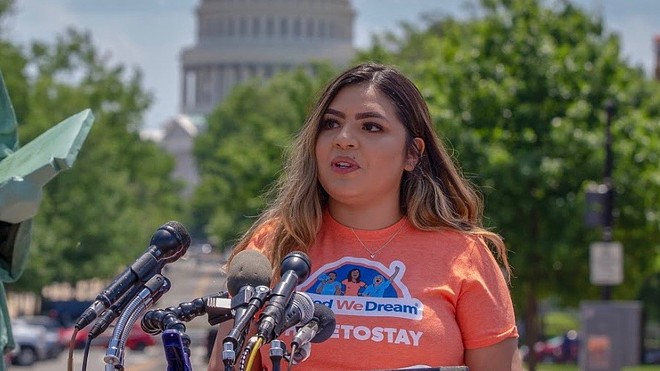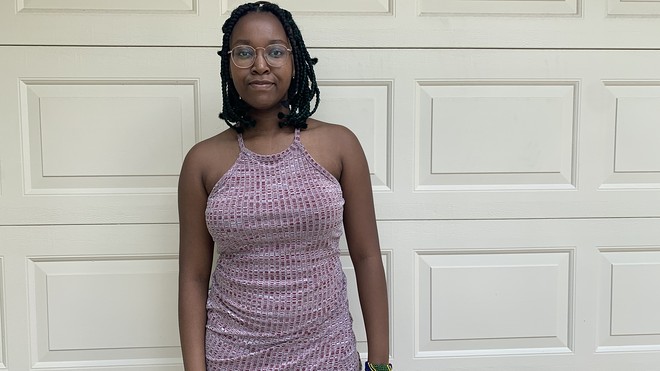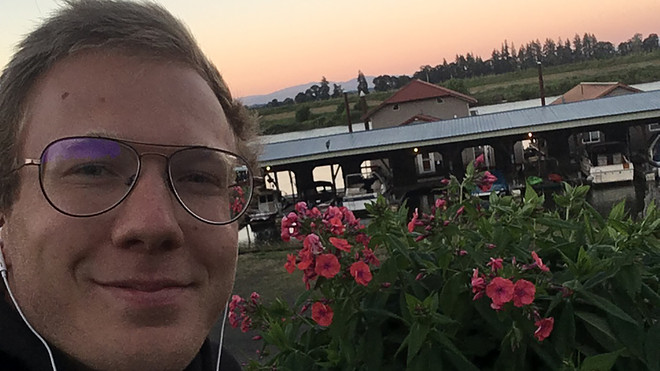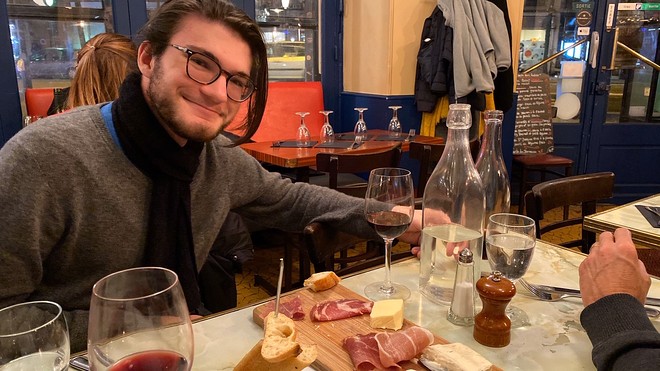The coronavirus pandemic sent students and colleges scrambling this spring to find a way to continue their education without the trappings of classrooms, office hours and a university community. Now, colleges and students are planning for a fall semester full of masks, plexiglass and uncertainty.
MarketWatch spoke to four students about the experience of having their education interrupted and how they’re thinking about their future when so much remains unknown. MarketWatch plans to check back in with them as their college career continues.
Luz Chavez became her family’s sole breadwinner

Luz Chavez became the family breadwinner when the pandemic hit.
Courtesy of Luz Chavez
The coronavirus pandemic not only disrupted Luz Chavez’s education, it also turned her into her family’s sole breadwinner.
Chavez’s dad had already lost his job a few months before the virus began sweeping the country. When large gatherings became no longer possible, Chavez’s mom, who worked in hospitality, lost her job too. Chavez’s younger siblings, who were working in child care, also saw their work disappear once the Washington D.C. metro region, where Chavez and her family live, shut down.
“It was within a week that I realized that I was going to be the only source of income for my family,” said Chavez, 22, who works as a fellow for United We Dream, an immigrant youth network.
That stress made it difficult for Chavez to focus on her classes, which had moved online in the spring. She considered taking time off next year from Trinity Washington University, the college she attends in Washington, D.C., to focus on helping her family earn as much money as possible. But her advisor at the school and her parents, who are committed to her education, convinced Chavez that she should keep working towards her degree.
“I know that my education can’t be taken away and it’s really important for my family at least to know that their struggles of coming to this country aren’t taken for granted,” Chavez said.
Chavez is part of the Deferred Action for Childhood Arrivals or DACA program, an initiative started during the Obama administration that allows undocumented young adults who were brought to the United States with their parents when they were kids to work here legally. Chavez came to the U.S. with her family from La Paz, Bolivia, when she was four years old.
Chavez’s college degree — and the money and opportunity it would earn her — could be a crucial tool to help her family. But her journey to college hasn’t been easy. Chavez first learned she was undocumented when her parents took her to fill out the DACA application in her junior year of high school.
Without access to federal financial aid, Chavez had to look for other resources to pay for school. Chavez started at a community college where she found professors and other advocates who helped her locate scholarships. The last two years of her community college education were fully funded by a grant. Chavez continued to build on her knowledge of resources for undocumented students and eventually found a scholarship that would cover her last two years of college Trinity.
Still, Chavez’s immigration status means that she hasn’t been eligible for a major source of funding available to other students during this trying period. Secretary of Education Betsy DeVos released a rule in June that banned universities from distributing emergency grants from the CARES Act — a coronavirus relief bill passed earlier this year — to undocumented students.
“It really does take a toll on me knowing that there are services available, but they are going to be restricted,” Chavez said.
Chavez received some welcome news in June when the Supreme Court ruled that the Trump administration couldn’t immediately end DACA. She rushed to the Supreme Court building to celebrate after hearing the news. “It felt so liberating knowing that I was there in community,” Chavez said. “I’m relieved that I don’t have it on the back of my mind for time being at least.”
Maria Sailale has been taking care of young siblings while attending online classes

Maria Sailale balanced taking care of her siblings with studying this spring.
Courtesy of Maria Sailale
When the virus forced students away from college classrooms and children home from their schools, Maria Sailale’s schedule got very busy. As the second oldest of five children with two parents who had jobs that sometimes required them to work outside the home, Sailale had a lot of responsibility.
In the spring, after her courses at the University of Texas-Austin moved online, Sailale would typically wake up around 4 a.m. to get her homework done. Then she turned to her day job.
“I would take care of my siblings during the day and make sure they were doing their work and care for this little one-year-old who is trying to figure out life,” she said.
For courses that required her to attend at the same time as her classmates and participate, like philosophy, Sailale would sometimes lock herself in a room with that one-year-old so she could supervise him while also paying attention to her screen.
“It was kind of established that professors are obligated to be a little bit more compassionate to students,” during the pandemic period, Sailale said. Nonetheless, “it was hard for me to reach out to them for help and try to help them understand my situation. Luckily I pulled through somehow.”
Regardless of whether her classes are online or in person this fall, Sailale said she plans to move into an apartment she’s rented with friends in Austin. “I have to be selfish at this point,” she said. She expects her classes to be harder this coming semester, and the challenge of balancing school work with caring for her siblings isn’t one she’s eager to repeat.
Sailale’s parents understand and are supportive of her move back to Austin because, as she puts it, “they’re big on education.”
Sailale, a rising sophomore, has enjoyed her experience at UT so far. She decided to attend the school in large part because she was able to pay for it entirely through scholarships and grants. Sailale and her family immigrated to the U.S. from Tanzania when she was about four years old, and she and her family aren’t permanent U.S. residents. That means Sailale isn’t eligible for federal financial aid.
Her first couple of months at school were an adjustment. She couldn’t attend summer orientation because she was working (she went to a smaller orientation closer to the start of the school year instead). In addition, it took Sailale a little while to get a handle on the resources available at her school.
“At universities you’re dealing with people who might be legacy or they’ve known they were going to that university for their whole lives,” she said. “There’s a big group of students that end up not being plugged into that and you just have to figure it out for yourself.”
Ultimately though, Sailale met “really good people,” who she said she feels like she relates to. Now, she’s mentally preparing to return to Austin and attend some classes in person in the fall. UT is offering students the option to take all of their classes online. For students interested in returning, the school is starting the fall semester in late August and sending students home the day before Thanksgiving and taking other safety precautions.
“I’m a little iffy about it,” Sailale said about the idea of returning to school in person. “I don’t know where everyone else’s head is at, but cases have gone up. I have no idea how it’s going to work out.”
Mackenzie Myers is so close to graduating that he decided to ‘power through’

Mackenzie Myers is so close to graduating this year that he plans to power through.
Courtesy of Mackenzie Myers.
Regardless of the format, Mackenzie Myers will likely be taking classes this fall.
“I’m so close that I just want to power through and be done,” the 22-year-old said.
Myers needs just two more quarters of classes to finish his environmental studies degree at the University of Oregon, which is currently planning for a mix of in-person and online classes. After he graduates, Myers hopes to work in outdoor education. “Any job that I can work outside and work with people and work with youth,” he said.
Myers came to college in 2017 pretty clear on what he wanted to study. That’s in part because he took two years after graduating high school to figure it out. During those two gap years, as they’re often called, Myers participated in an outdoor education program, hiked the Appalachian Trail and worked as a lifeguard and for a tree care company to save money before heading to school.
Those two years of structuring his own time, which also included periods where he lived on his own, helped Myers adjust to the independence of college easily. They also helped Myers feel comfortable seeking out the resources that would help him get the most out of his schooling. “I was able to make faculty connections,” he said. “I felt more confident from the get-go going to office hours and advising.”
When the impact of the pandemic started to become clear in mid-March, Myers decided to “hunker down” in the house he rented with roommates near his school. When Myers heard classes would go completely online during the spring term, “I was definitely pretty hesitant,” he said. “I thought about not doing spring classes and just waiting.”
But ultimately, the classes went relatively smoothly. Myers appreciated that his professors made accommodations for these unprecedented times, including in one case giving every student an A and in other cases, making finals optional. He also discovered unexpected benefits of the online courses, like the added flexibility in his day.
Myers knows that given the pandemic, the fall semester won’t be an ideal version of college. But because he’s so close to finishing his degree, he’ll likely take part in it. Finances also played a role in his decision, Myers said. Because his father is an employee of a state university, he gets a steep discount on tuition.
If this more limited experience cost full price, Myers isn’t sure he’d go through with it. Instead, he’d probably wait until the winter term and see how things go and resume classes then. “For me personally and my family, I don’t think that would really be worth it,” he said.
Stuart Myers is taking a year off

Stuart Myers plans to take a year off from college this year.
Courtesy of Stuart Myers
Mackenzie Myers’ younger brother, Stuart, has decided to take a year off from classes in part because it doesn’t make sense to invest so much in an experience that’s likely to be different from what he signed up for initially.
Stuart Myers is part of the Global BFA in Film Art program at Emerson College in Boston. Under typical circumstances, students study film and visual art for three academic years at the Paris College of Art, three summers in Boston, and one summer in the Netherlands. In addition to the opportunity to spend so much time abroad, the program provides hands-on access to professional-level equipment. Right now, the program is planning for a hybrid semester with some online and some in-person courses while following French health guidelines.
But given the constantly evolving nature of the pandemic, Myers decided to take a year off from the program. “The uncertainty of what schooling was going to be like for the fall and the spring, adding international travel to the mix — it made more sense to just take a year off,” he said.
A major draw of the program for Myers was the chance to spend so much time in Paris. He’d taken six years of French in high school and also spent some time working on a farm in France during a gap year he took between high school and college.
But the pandemic had different plans. Once it became clear that travel would be restricted into the U.S., Myers and the rest of his cohort huddled in the lobby of their student housing, making phone calls to try to figure out how to get home. Myers stayed for about a week longer than most of his classmates to wait out the crowds and unsafe conditions at airports.
During that time, Myers studied, cooked and lived in his one-room apartment with grocery shopping as one of the few permissible reasons for escape. “Our single studio apartments became our photo studios.”
Since Myers already had experience with a gap year — albeit a very different one — he was comfortable with the idea of delaying his progress towards a degree. Now he’s researching exactly how he’ll spend the next year. He’s considering a certificate program in coding or web design, “something supplemental to a film art degree, but nothing that needed to be in person.”
Myers is hoping that in addition to taking courses, he may be able to find a job and save up money for when he returns to school. “Ultimately I think taking a gap year right now, taking a year off of the traditional model of college is the right decision.”










Add Comment